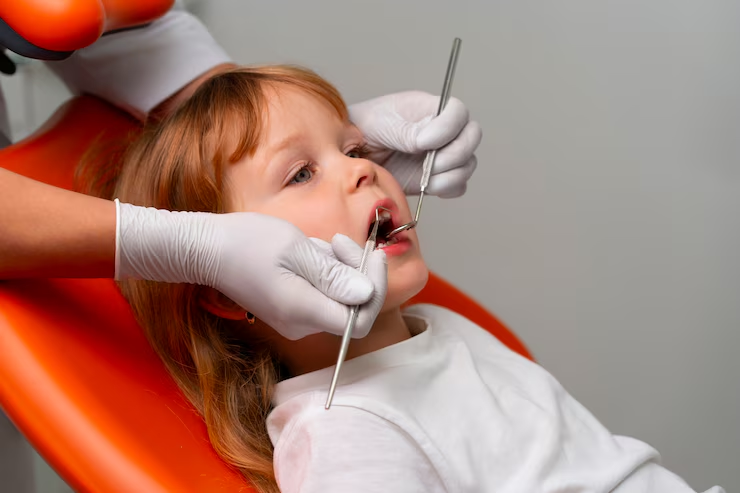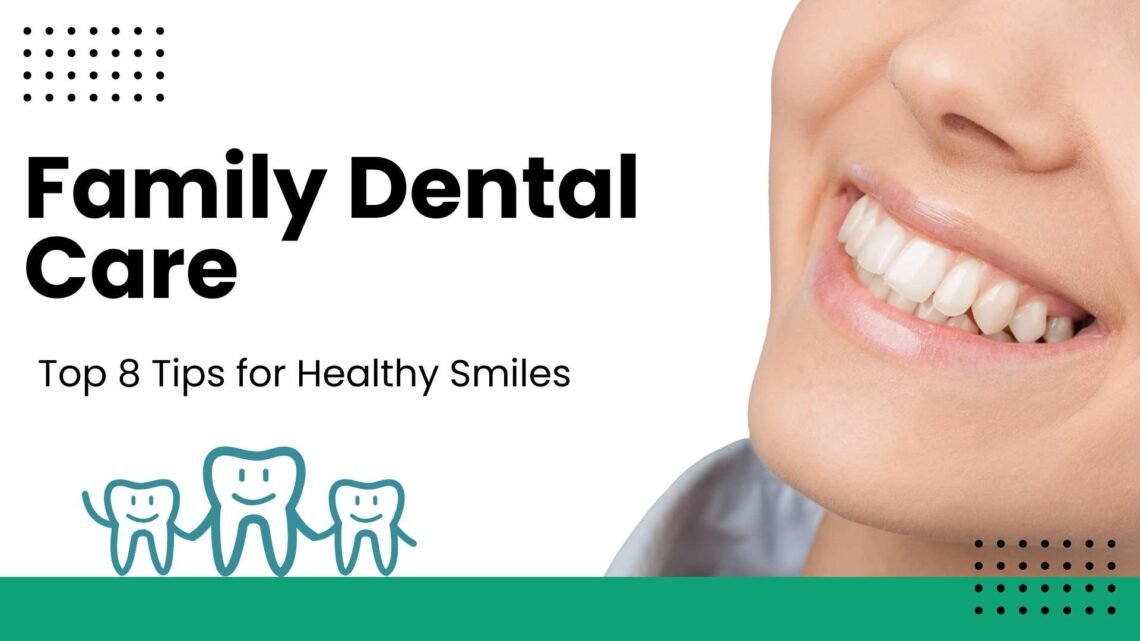Family dental care is more than just brushing and flossing. It’s a lifelong commitment to good oral hygiene habits that start in childhood and continue well into adulthood. When every member of your household—from toddlers to grandparents—follows smart dental routines, the result is not just healthy smiles but also better overall health.
In this comprehensive guide, you’ll discover everything you need to know about family dental care and how to maintain healthy smiles at every age. From toddlers getting their first teeth to seniors managing dentures, proper oral hygiene is essential for every family member. You’ll learn how to instill good brushing and flossing habits in children, understand the dental challenges adults and seniors may face, and recognize the importance of regular dental checkups to prevent serious oral and overall health problems.
Effective family dental care goes beyond brushing—it includes diet, lifestyle choices, and preventive treatments like sealants and fluoride. This guide also shares the top 8 expert tips to help you keep your household’s dental health in peak condition. Whether you’re building a routine for your kids or improving your own oral hygiene, these strategies will ensure long-lasting dental wellness. Invest in family dental care today for brighter smiles and healthier lives tomorrow.
🧠 Why Family Dental Care Is Important

Oral health is a mirror of your overall health. Gum disease, cavities, bad breath, and tooth loss aren’t just mouth problems—they can affect the heart, lungs, and even brain function. Infections in the mouth can spread, and poor dental hygiene has been linked to conditions like diabetes, heart disease, and respiratory infections.
Starting early with proper oral care is one of the most important steps in building strong, healthy habits for life. When it comes to family dental care, teaching children how to take care of their teeth from a young age helps prevent cavities, gum disease, and other dental issues down the line. By instilling good brushing and flossing routines early, you not only protect their teeth but also promote a lifelong commitment to hygiene.
This early foundation reduces the need for expensive treatments later and helps your child grow up with confidence and a healthy smile. Involving kids in daily dental routines, choosing fun toothbrushes, and making dental visits a positive experience are all part of successful family dental care. The habits children form now will carry into adulthood, saving families time, money, and discomfort in the future. Remember, healthy dental routines start at home and grow stronger with family support.
👨👩👧👦 What Is Family Dental Care?
Family dental care refers to comprehensive oral health practices and professional treatments provided for individuals of all ages within a household. It includes:
- Preventive care (cleanings, exams, fluoride treatments)
- Restorative care (fillings, crowns)
- Orthodontics (braces or aligners)
- Periodontal care (gum disease treatment)
- Education on daily hygiene habits
Whether it’s a child losing their first tooth or a senior needing dentures, family dental care addresses all stages of oral health.
👶 Starting Early: Dental Care for Kids

Children’s oral health plays a crucial role in shaping their overall well-being and sets the foundation for a lifetime of healthy habits. Within the scope of family dental care, it’s essential to understand that cavities remain the most common chronic disease among children—yet they are entirely preventable with proper care. Teaching kids to brush twice daily with fluoride toothpaste, floss regularly, and maintain a balanced diet can significantly reduce the risk of tooth decay.
Early dental visits, ideally by the child’s first birthday, help identify potential issues before they worsen and create a comfort level with professional dental care. Integrating these practices into your child’s daily routine is a key part of effective family dental care, encouraging them to take responsibility for their health early on. Parents who prioritize dental care not only protect their child’s smile but also instill lifelong habits that contribute to overall health, confidence, and well-being.
Tips for Children:
- First dental visit by age 1
- Use fluoride toothpaste (pea-sized amount)
- Teach them to brush twice a day
- Supervise brushing until age 7–8
- Avoid sugary snacks and drinks
- Introduce flossing early
Regular visits to a pediatric dentist help identify issues early and reduce dental anxiety.
👩 Adults & Dental Health
Many adults tend to postpone or neglect dental visits because of busy schedules, financial concerns, or dental anxiety. However, ignoring oral health can lead to serious consequences. Within the framework of family dental care, it’s essential for adults to understand that untreated dental problems—such as cavities, gum disease, or tooth sensitivity—don’t go away on their own. Instead, they worsen over time and often lead to more painful, complicated, and costly treatments. Prioritizing regular dental checkups and cleanings helps catch issues early, reducing long-term damage and expenses.
Good oral health is not only important for a confident smile but also linked to overall wellness, including heart and digestive health. By setting a good example and maintaining consistent dental care, adults can reinforce the importance of family dental care for younger members. Remember, preventive care is always easier, more affordable, and less stressful than emergency treatment after the problem has progressed.
Common Adult Issues:
- Gingivitis or periodontitis
- Tooth decay
- Sensitivity
- Grinding (bruxism)
- Tooth discoloration
Regular cleanings, proper brushing, flossing, and avoiding tobacco are critical. Adults should also protect their teeth during sports or high-impact activities with mouthguards.
👵 Seniors: Aging and Oral Health
As we age, maintaining good oral health becomes more challenging due to factors like medication side effects, chronic health conditions, and the natural wear and tear on teeth and gums. In the context of family dental care, seniors require special attention to prevent complications such as tooth loss, dry mouth, gum disease, and oral infections. Medications for blood pressure, diabetes, and other common conditions often reduce saliva flow, increasing the risk of decay and discomfort. Additionally, issues like receding gums and tooth sensitivity become more common with age.
Proper dental care for seniors should include regular dental checkups, gentle brushing techniques, denture care if applicable, and attention to any signs of oral pain or discomfort. Incorporating senior dental needs into your overall family dental care routine ensures that every generation in the household receives the support they need for optimal oral health. A proactive approach helps seniors maintain their comfort, dignity, and quality of life.
Issues Faced:
- Dry mouth
- Gum recession
- Tooth loss
- Denture care
- Oral cancer risk
Routine checkups help manage these problems, ensuring comfort and quality of life in later years.
🏆 Top 8 Family Dental Care Tips for Healthy Teeth and Gums
1. 🪥 Brush Twice Daily (Correctly)

Brushing is the cornerstone of good oral hygiene and the first line of defense against plaque, cavities, and gum disease. In the scope of family dental care, it’s vital for every family member—from toddlers to seniors—to brush their teeth at least twice a day using fluoride toothpaste. Consistent brushing removes food particles and bacteria that can lead to tooth decay and bad breath. Teaching children the proper technique early sets the stage for lifelong dental health, while adults and seniors should continue brushing thoroughly to prevent common issues like receding gums and enamel erosion.
For younger kids, supervision ensures they clean all surfaces properly, and for seniors, special toothbrushes or electric brushes may help with mobility challenges. Making brushing a shared family routine can encourage better compliance and make the process more engaging. Strong family dental care begins with the simple habit of brushing—it’s a small act that makes a big impact on oral health.
- Use fluoride toothpaste
- Brush for 2 full minutes
- Replace toothbrushes every 3–4 months
- Use electric toothbrushes for better results
📝 Family Tip: Make brushing a group activity for young kids to make it fun and consistent.
2. 🧵 Don’t Skip Flossing
Flossing is a vital part of family dental care because it removes food particles and plaque from between the teeth and along the gumline—places a toothbrush can’t easily reach. When these areas are neglected, they become breeding grounds for bacteria, leading to gum disease, cavities, and even tooth loss over time. Encouraging every member of your household to floss daily helps protect their gums and maintain strong, healthy teeth.
For children, teaching proper flossing techniques early builds lifelong habits, while adults and seniors may benefit from tools like floss picks or water flossers for easier use. Flossing also helps prevent bad breath and enhances overall oral cleanliness. As part of a comprehensive family dental care routine, daily flossing is just as important as brushing. When done consistently, it significantly lowers the risk of dental problems, ensuring your family’s smiles stay healthy, bright, and cavity-free throughout all stages of life.
- Start flossing your child’s teeth as soon as two teeth touch
- Use floss picks or water flossers if string floss is difficult
📝 Family Tip: Use colorful floss picks for kids to make flossing more appealing.
3. 🧃 Limit Sugar and Sticky Snacks
Sugary and acidic foods are among the biggest enemies of healthy teeth, especially within the context of family dental care. These foods feed harmful bacteria in the mouth, producing acids that attack tooth enamel and lead to decay and erosion. From candy and soda to fruit juices and processed snacks, frequent consumption of such items increases the risk of cavities, especially in children. For adults and seniors, it can worsen sensitivity and contribute to enamel thinning.
As part of effective family dental care, it’s important to educate all family members about the impact of diet on oral health. Encourage healthier alternatives like crunchy vegetables, dairy products, and plenty of water, which help neutralize acids and strengthen enamel. Practicing moderation and brushing after consuming sugary or acidic foods can significantly reduce damage. Building smart eating habits not only supports better dental health but also contributes to overall wellness for the entire family
- Avoid candy, soda, juice, and sticky snacks
- Offer water, fruits, vegetables, cheese, and nuts instead
📝 Family Tip: Replace sugary bedtime snacks with a glass of water and brush before bed.
4. 🦷 Schedule Regular Dental Checkups

Professional cleanings are a crucial part of family dental care because they remove tartar and hardened plaque that regular brushing and flossing can’t eliminate. Even the best at-home routines can miss certain areas, allowing buildup that can lead to gum disease, tooth decay, and bad breath. Regular dental visits—ideally every six months—ensure that your entire family receives a thorough cleaning and a professional evaluation. Dentists check for hidden issues like cavities between teeth, early signs of gum disease, enamel erosion, or misalignment that could affect chewing and oral health.
These early detections save families from expensive and painful treatments later on. Prioritizing routine checkups teaches children to view dental care positively and helps adults and seniors stay on top of their oral health needs. Making professional dental visits part of your family dental care plan is a smart step toward long-term wellness, brighter smiles, and fewer dental emergencies in the future.
- Visit the dentist every 6 months
- Consider fluoride treatments for children
- Dental X-rays help track changes and spot problems early
📝 Family Tip: Book family appointments together to make visits easier and build a routine.
5. 🛡️ Use Sealants and Fluoride for Kids
Dental sealants are protective coatings applied to the back teeth to prevent cavities.
- Ideal for kids ages 6–14
- Fluoride strengthens enamel
📝 Family Tip: Talk to your dentist about sealants for your child’s molars as soon as they appear.
6. 💤 Prevent Teeth Grinding (Bruxism)
Stress and poor sleep are often overlooked contributors to dental problems, especially within the scope of family dental care. One common issue linked to both is teeth grinding, also known as bruxism. This usually occurs at night and can go unnoticed for a long time. Over time, grinding wears down enamel, weakens teeth, and causes symptoms like jaw pain, headaches, and increased tooth sensitivity. It can even lead to cracked or damaged teeth if not addressed early.
For children and adults alike, managing stress through healthy coping techniques and ensuring adequate sleep are essential preventive strategies. In a comprehensive family dental care routine, it’s important to mention any symptoms like jaw soreness or morning headaches during dental visits. Dentists may recommend night guards or stress management techniques to protect your teeth. Addressing stress-related dental issues early helps preserve oral health and ensures the entire family maintains strong, pain-free smiles.
- Signs include tooth sensitivity and jaw stiffness
- Use nightguards if needed
- Reduce screen time and stress before bed
📝 Family Tip: Monitor your child’s sleep for signs of grinding and discuss with a dentist if needed.
7. 🚭 Avoid Tobacco and Limit Alcohol
Tobacco and alcohol use pose serious risks to oral health and should be addressed in any comprehensive family dental care plan. Both substances harm the delicate tissues in the mouth, increasing the risk of gum disease, tooth loss, and oral infections. Tobacco, whether smoked or chewed, reduces blood flow to the gums and delays healing, while alcohol dries out the mouth and creates an environment where bacteria thrive.
When used together, the risk of developing oral cancer significantly increases. It’s important for families to be aware of these dangers and educate both teens and adults about the long-term consequences. Regular dental checkups are crucial for early detection of any abnormalities linked to tobacco or alcohol use. Promoting a tobacco-free and alcohol-conscious lifestyle is not only beneficial for overall health but also vital for maintaining healthy teeth and gums. A proactive approach in family dental care ensures better protection for every member’s smile.
- Smoking leads to staining, bad breath, and tooth loss
- Alcohol dries out the mouth and weakens enamel
📝 Family Tip: Set a good example by avoiding these habits yourself.
8. 🧼 Teach and Maintain Good Oral Habits
Make dental hygiene a daily, positive family habit.
- Use brushing charts and reward systems for kids
- Teach by example — children imitate parents
- Store toothbrushes properly and keep them clean
📝 Family Tip: Make oral care part of the daily family routine — like reading or mealtime.
🛍️ Must-Have Dental Care Products for Families
- Soft-bristled toothbrushes for every age
- Fluoride toothpaste
- Floss and interdental brushes
- Mouthwash (age-appropriate)
- Electric toothbrushes (especially for adults and teens)
- Water flossers (great for braces or sensitive gums)
📆 Creating a Family Dental Routine
Morning:
- Brush teeth after breakfast
- Rinse with water or mouthwash
Evening:
- Brush after dinner or before bed
- Floss between all teeth
- Use a gentle mouth rinse
- Avoid eating after brushing
🚨 Warning Signs to Watch For
Don’t wait for pain to visit a dentist. Be proactive if you notice:
- Bleeding gums
- Persistent bad breath
- Tooth sensitivity or pain
- White spots or discoloration
- Loose teeth
- Dry mouth
💰 Cost-Saving Tips for Family Dental Care
- Use dental insurance or government dental programs
- Visit dental schools for low-cost care
- Choose family dental plans
- Prioritize prevention to avoid costly treatments
- Ask for discounts on multiple appointments
🏥 How to Choose the Right Family Dentist
Look for a clinic that:
- Offers services for all ages
- Has pediatric-friendly staff and tools
- Is conveniently located
- Offers emergency care
- Provides clear communication and payment plans
Read reviews, ask for referrals, and visit the office before committing.
🧠 Dental Health and Overall Wellness
Dental problems can contribute to or signal other health issues:
| Dental Issue | Possible Link |
| Gum disease | Heart disease, diabetes |
| Tooth loss | Poor nutrition |
| Dry mouth | Medication side effects |
| Oral lesions | Immune disorders or cancer |
Good oral hygiene supports not just teeth and gums but your entire body’s health.
✨ Final Thoughts: Make Family Dental Care a Priority
Family dental care isn’t just about preventing cavities — it’s about building a lifetime of healthy habits, confident smiles, and overall well-being. From toddlers learning to brush to seniors maintaining dentures, every family member deserves the best in oral care.
Focusing on family dental care is one of the most powerful ways to promote health, responsibility, and long-term wellness across all generations. When dental health becomes a shared family value, it teaches children the importance of responsibility from an early age. Kids learn by example, so when parents prioritize brushing, flossing, and regular checkups, children are more likely to develop strong and lasting oral care habits.
Consistency is key. By creating a daily routine that includes proper brushing and flossing, you help reduce the risk of cavities, gum disease, and expensive dental procedures. Scheduling bi-annual dental visits for every family member ensures that issues are detected early and treated promptly.
Beyond the physical benefits, maintaining excellent family dental care builds a culture of self-care. It sends a clear message that health and well-being are valued at home. Investing in quality dental tools like electric toothbrushes, fluoride toothpaste, and floss, along with dedicating time each day to oral hygiene, pays off in healthier smiles and greater confidence.
When families work together to maintain dental health, the results are long-lasting—strong teeth, healthier gums, and fewer dental problems in the future. From toddlers to seniors, everyone benefits when dental care is a family commitment. Make family dental care a priority, and you’ll not only protect oral health but also strengthen the bonds and routines that promote lifelong well-being.
✅ Summary: Top 8 Family Dental Care Tips
| Tip | Why It Matters |
| 1. Brush Twice Daily | Prevents plaque and decay |
| 2. Floss Every Day | Keeps gums healthy |
| 3. Limit Sugar | Reduces cavity risk |
| 4. Regular Dental Visits | Early problem detection |
| 5. Fluoride & Sealants | Protect kids’ teeth |
| 6. Prevent Grinding | Avoids enamel damage |
| 7. No Tobacco or Alcohol | Reduces oral cancer risk |
| 8. Build Healthy Habits | Long-term dental wellness |





